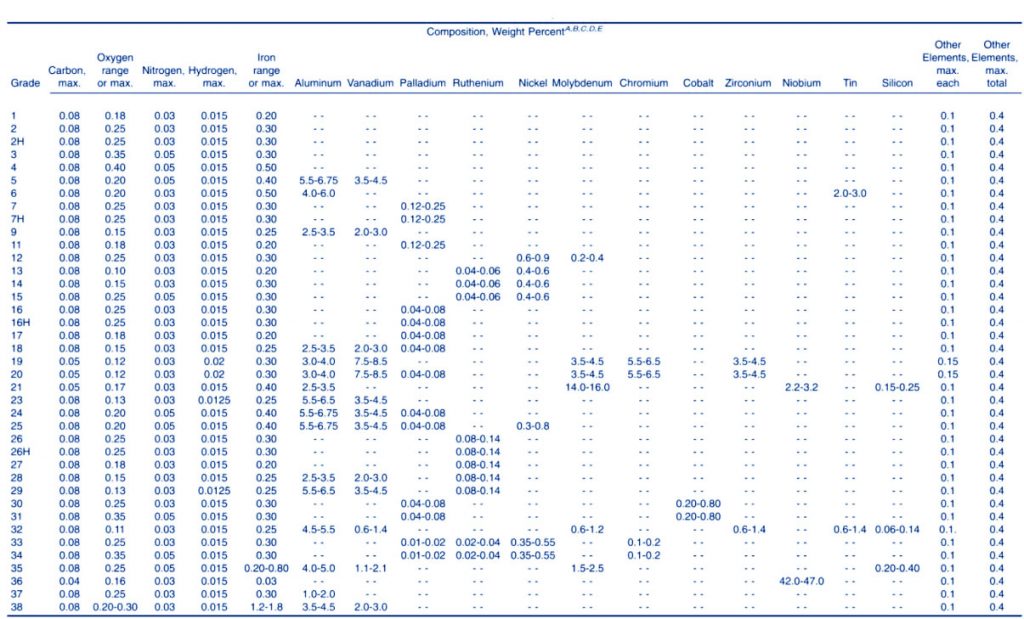GENERAL
Titanium is a chemical element with the symbol Ti and atomic number 22. It is a lustrous transition metal with a silver color, low density, and high strength.
Titanium’s properties, which are a combination of high strength, stiffness, toughness, low density, and good corrosion resistance provided by various titanium alloys at very low to elevated temperatures, allow weight savings in aerospace structures and other high-performance applications. Titanium is a low-density element (approximately 60% of the density of iron) that can be strengthened by alloying and deformation processing. Titanium is nonmagnetic and has good heat-transfer properties. Its coefficient of thermal expansion is somewhat lower than that of steel and less than half that of aluminum. One of titanium’s useful properties is a high melting point of 3135°F (1725°C). This melting point is approximately 400°F above the melting point of steel and approximately 2000°F above that of aluminum.
The following table lists all the grades and their chemical composition according to ASTM.
Most Commonly Used Titanium Grades
Pure titanium and its alloys are commonly defined by their grades defined by the ASTM Internation standard. In general, there are almost 40 grades of titanium and its alloys. Following is an overview of the most frequently encountered titanium alloys and pure grades, their properties, benefits, and industrial applications.
Grade 1 – The most ductile and softest titanium alloy. It is a good solution for cold-forming and corrosive environments. It possesses the greatest formability, excellent corrosion resistance, and high impact toughness.
Grade 2 – Commercially pure titanium grade 2 is very similar to grade 1, but it has higher strength than grade 1 and excellent cold-forming properties. It provides excellent welding properties and has excellent resistance to oxidation and corrosion. Grade 2 of titanium is the most common grade of the commercially pure titanium industry.
Grade 5 – Ti-6Al-4V Grade 5 is the most commonly used alloy and it is an alpha + beta alloy. Generally, Ti-6Al-4V is used in applications up to 400 degrees Celsius. It has a density of roughly 4420 kg/m3. It is significantly stronger than commercially pure titanium (grades 1-4) due to its possibility to be heat treated. Grade 5 is an excellent combination of strength, corrosion resistance, weld, and fabricability.
Grade 23 – Ti-6Al-4V-ELI The essential difference between Ti6Al4V ELI (grade 23) and Ti6Al4V (grade 5) is the reduction of oxygen content to 0.13% (maximum) in grade 23. Reduced interstitial elements oxygen and iron improve ductility and fracture toughness with some reduction in strength. It’s the top choice for any sort of situation where a combination of high strength, lightweight, good corrosion resistance, and high toughness are required. This grade of titanium, medical-grade of titanium, is used in biomedical applications such as implantable components due to its biocompatibility, good fatigue strength, and low modulus.
Grade 7 -Ti-Pd-Alloy Grade 7 Titanium has physical and mechanical properties equivalent to CP3 titanium or Grade 2. It has excellent welding and fabrication properties and is extremely resistant to corrosion, especially from reducing acids. Grade 7 Titanium is an unalloyed titanium grade with standard oxygen content and the addition of palladium. The grade is characterized by excellent corrosion resistance in reducing and oxidizing environments and is typically used within, for example, the chemical industries.
Grade 9 -Ti-3Al-2.5V This grade has medium strength that falls between Grade 4 and Grade 5. It has excellent corrosion resistance and is used in aerospace and industrial applications. It can be used at higher temperatures than Grades 1 through 4. By the way, Grade 9 titanium has good cold rolling properties, is widely used in bicycle frames. Click here to know more information about our Grade 9 titanium tube for bicycles.

